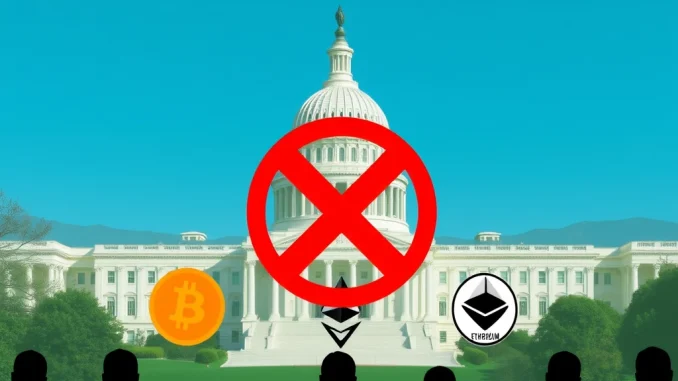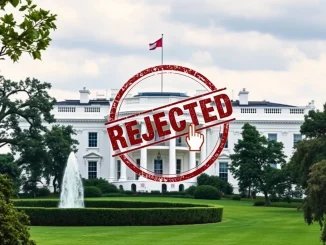
A significant move is underway on Capitol Hill that could impact how government figures interact with the digital asset space. A new US Senate crypto bill has been introduced, targeting the ability of senior officials to promote cryptocurrencies. This development is particularly relevant in the current political climate, where cryptocurrency has become a more visible topic.
What is This Proposed Crypto Promotion Ban?
Twenty U.S. Senate Democrats have put forward legislation titled the “End Crypto Corruption Act of 2025.” At its core, this bill seeks to implement a broad crypto promotion ban for key government personnel. The proposed restrictions would apply to:
- The President
- The Vice President
- Members of Congress (Senators and Representatives)
- Certain senior executive appointees
- The spouses and dependent children of the above officials
The ban specifically prohibits these individuals and their families from issuing, sponsoring, or endorsing cryptocurrencies. This means they would be unable to publicly support specific digital assets or projects in a way that could be seen as a personal endorsement or promotion.
Why Introduce the End Crypto Corruption Act?
The motivation behind the End Crypto Corruption Act appears rooted in concerns about potential conflicts of interest and the appearance of impropriety when high-ranking officials or their families engage in cryptocurrency promotion, especially if they stand to gain financially. The bill is reportedly a direct response to situations involving prominent figures.
For instance, the bill is seen by some as a reaction to reports and concerns regarding former President Trump and his wife potentially profiting from involvement with memecoins. The idea is to prevent officials from leveraging their public position or influence to benefit specific crypto assets they or their families might hold or be associated with.
Another figure often mentioned in discussions around officials and crypto is Elon Musk. While not a traditional government official, the bill could potentially affect individuals serving in certain special government capacities if they fall under the scope of “certain executive appointees.” Musk recently clarified the nature of the Department of Government Efficiency (DOGE), stating it has no intention of using the Dogecoin memecoin for official purposes, but the bill’s reach aims to cover a wide range of senior government officials crypto activities.
What Does This Mean for Government Officials and Crypto?
If passed, this legislation would draw a clear line, significantly limiting how senior government figures can publicly interact with the cryptocurrency market. It aims to build public trust by removing potential avenues for personal financial gain tied to official influence in the volatile crypto space.
This bill reflects growing scrutiny from lawmakers regarding the intersection of public service and personal involvement with digital assets. While proponents argue it’s a necessary step for ethics and transparency, others might raise questions about free speech rights or the practicality of enforcing such a broad ban across complex family structures and diverse digital asset holdings.
Summary: A New Era for Government Crypto Ethics?
The introduction of the “End Crypto Corruption Act” signals a serious effort by some U.S. lawmakers to address potential ethical challenges posed by senior government officials crypto holdings and promotions. By proposing a comprehensive crypto promotion ban for top officials and their families, the bill directly confronts concerns highlighted by situations like the reported Trump crypto associations and the public profile of figures like Elon Musk in the crypto world. This US Senate crypto bill is a key development to watch as the debate around cryptocurrency regulation and government ethics continues.



